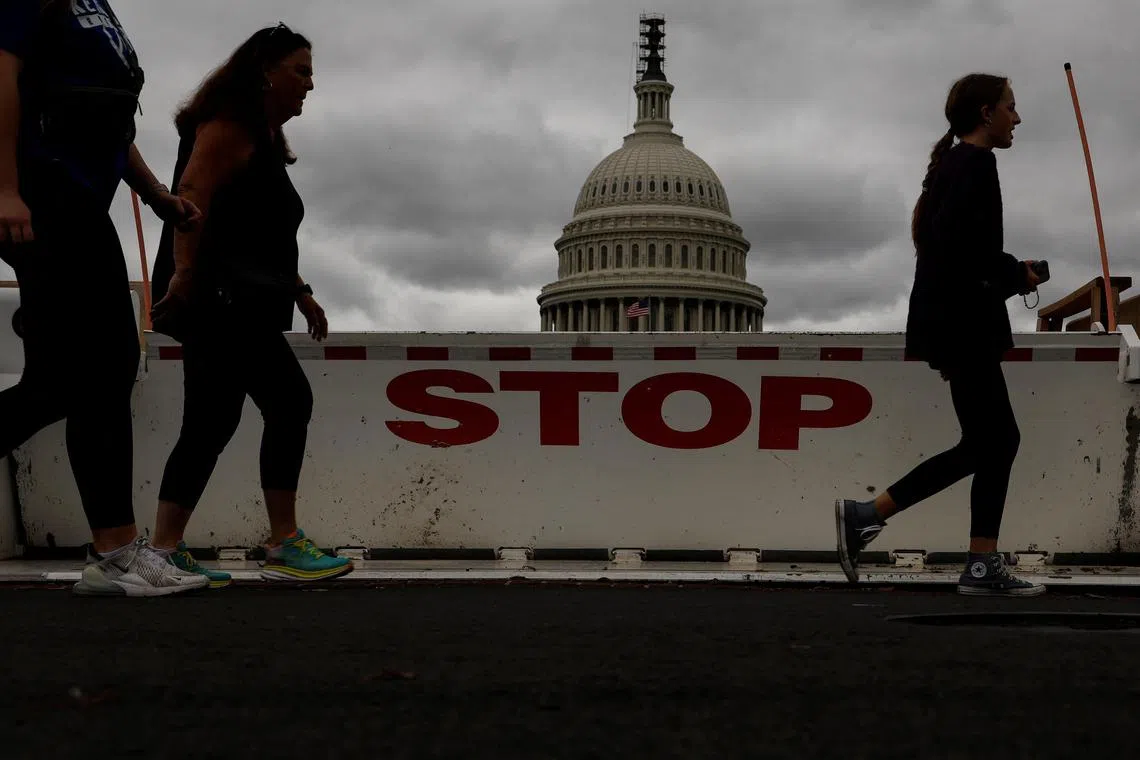Shutdown showdown in US Congress: Time running out to fund government
Sign up now: Get ST's newsletters delivered to your inbox

The US federal government will shut down on Sunday if Congress fails to pass a new spending Bill.
PHOTO: REUTERS
WASHINGTON – The US House of Representatives and Senate are taking sharply divergent paths in a high-stakes spending battle, with just five days remaining until a deadline that could force wide swathes of the government to shut down for the fourth time in a decade.
President Joe Biden and one of his top aides warned on Monday that a shutdown could cause widespread suffering,
The Democratic-controlled Senate planned on Tuesday to vote on a stopgap funding Bill with bipartisan support that would keep the federal government operating after current money runs out at midnight on Saturday (12pm on Sunday, Singapore time), giving negotiators more time to agree on full-year spending numbers.
Meanwhile, House Speaker Kevin McCarthy, aiming to hold off a rebellion by hardline members of his own Republican caucus, was pushing ahead with four full-year spending Bills
Hundreds of thousands of federal workers will be furloughed and a wide range of services, from economic data releases to nutrition benefits, will be suspended from Sunday if the two sides do not reach an agreement.
Agriculture Secretary Tom Vilsack told reporters earlier that the “vast majority” of the seven million participants in the Special Supplemental Nutrition Programme for Women, Infants, and Children (WIC) would see an immediate reduction in benefits in the days and weeks after a shutdown starts.
Nearly half of newborns in the United States rely on WIC.
In Washington, the National Zoo says it would have to curtail its farewell party for three giant pandas before they return to China.
Congress has shut down the government 14 times since 1981, though most of those funding gaps have lasted only a day or two. Though disruptive, they have not had a significant impact on the world’s largest economy.
But Moody’s warned on Monday that a shutdown this time would have negative implications for the US government’s AAA credit rating,
Mr Biden and Mr McCarthy had aimed to head off a shutdown in 2023 when they agreed in May,
Lawmakers on Mr McCarthy’s right flank have since rejected that number, demanding US$120 billion in cuts, even as more moderate members of their party, including top Senate Republicans, voiced support for the agreed-on plan.
That accounts for only a fraction of the total US budget, which will come to US$6.4 trillion for the current fiscal year.
Lawmakers are not considering cuts to popular benefit programmes like Social Security and Medicare, which are projected to grow dramatically as the population ages.
Republicans control the House by a narrow 221-212 majority and have few votes to spare, particularly since some Republican hardliners have threatened to move to oust Mr McCarthy from his leadership role if he relies on Democratic votes to pass legislation.
‘Paying the price’
Mr Biden himself has called on House Republicans to honour Mr McCarthy’s deal.
“Just a few months ago, the Speaker of the House and I agreed to spending levels of the government,” he said. “Now, a small group of extreme House Republicans, they don’t want to live up to that deal, and everyone in America could be faced with paying the price for it.”
Despite the looming shutdown deadline, the House will turn its attention first to the four full-year Bills, which even if they pass would not fund the full government or prevent a shutdown.
Success is not guaranteed: Republican hardliners blocked action on spending Bills last week, and some have said they would try to do so again.
If Mr McCarthy surmounts that first obstacle, debate could consume most of the week, leaving little time to hammer out a stopgap Bill before Sunday.
Republican Representative Ralph Norman, a member of the hardline House Freedom Caucus, said on Monday he was “100 per cent” certain that Congress would not be able to keep the government open.
Mr McCarthy said he was more optimistic. “I’m working everything we can to make sure this doesn’t happen,” he told reporters on Monday. “I always like the ball at the last second.”
How that might play out is unclear at this point. If the Senate passes a stopgap funding Bill, Mr McCarthy could allow a vote in the House, where it could pass with support from Democrats and more pragmatic Republicans.
But that could prompt Republican hardliners to act on their threat to depose Mr McCarthy, plunging the chamber further into chaos.
Former president Donald Trump, the front runner for the 2024 Republican nomination, has been cheering on the shutdown talk, saying on his Truth Social site: “Unless you get everything, shut it down!” REUTERS


